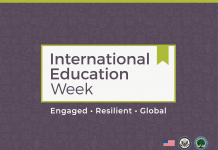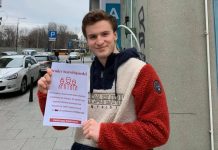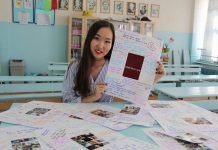Mariya Guzenko ‘03
Chelyabinsk, Russia/Farmington, PA
emelle [at] yandex [dot] ru
It’s obvious that a good rapport with the family is the student’s guarantee of a successful FLEX year. Luckily, my PDO prepared for a number of scenarios where problems may arise in the family. So I came to America bearing in mind that showers had to take less than five minutes and I was expected to say ‘Thank you’ more often than I was used to. Yet there was something I had to learn about firsthand, namely, switching host families. While this is not what you normally plan for, I’ve discovered it’s really up to you to make the most out of this experience.
Having seen efficiency on all stages of the program, I failed to realize that host families were not trained professionals, but enthusiasts sharing their hospitality with an exchange student. The program was as much of an adventure for them as it was for us. I was surprised to find out they did not know much about the FLEX program because they mostly dealt with local placement organizations. Nonetheless, their courage to welcome a new member into the family is quite commendable.
My first host mother was a middle-aged single woman who had never hosted a student before. This proved an advantage as I was not compared to previous host students, but also a drawback in that my host mother was not sure what to expect from the program. I am thankful to her for trying to make me feel comfortable in my new community, e.g. introducing me to the local Youth Club. However, the challenges of having a teenager in the family must have overwhelmed my host mother and some months later she said she felt I’d get a better experience in a big family who would be able to take me places.
So, I found myself moving to a different town. The most difficult aspect was how poorly I was prepared for adjusting to a new host family comparing to my adaptation upon arrival. The reason may be that I was expecting a culture shock at the initial stages of the year and put a lot of effort into getting involved in my school and community. Little did I know that I’d have to give up my ‘gains’ to do it all over again. As a result, I faced the second round of adjusting a little unprepared.
My new host family was quite different from the first one. It was a married couple with three kids living at home and one away at college. The family welcomed me warmly, yet some of their expectations from a Russian teenager seemed to be based on their previous exchange student. For example, my host parents were surprised that I had seen cars before and was not a fan of outdoor sports. The family atmosphere on the whole was also different. As opposed to the diplomatic, although not always approving ‘laissez faire’ policy of my first host mother, I encountered a frank, but sometimes critical attitude in my new family. It took me some time to modify my behavior to fit in my second family’s interaction framework.
My lifestyle also had to change. Accustomed to being able to walk anywhere in the first town, I suddenly found myself dependent on a ride and had to consider other people’s activities to make plans about my own. On the positive side, the family was always up to something, going to ski resorts or amusement parks, or having people over, so there was quite a choice of activities.
Even though I moved out of my first town, I tried to keep in touch with my first host mother, talking to her on the phone and visiting whenever I came there. Despite the difficulties in hosting an exchange student, she still cared and wanted to know how I was doing. In the long run, I ended up bringing back memories of two families and two communities instead of one — which also means I get two Christmas cards every year!





